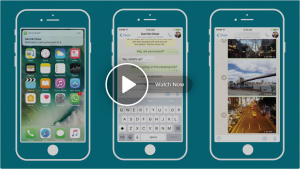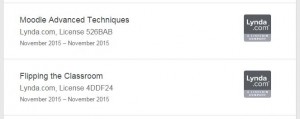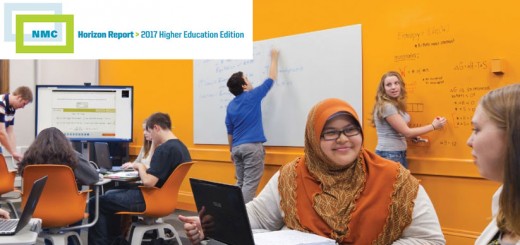Learn with Lynda: Learning WhatsApp
 In this month’s Learn with Lynda the spotlight is on Learning WhatsApp, a brand new course by Nick Brazzi, which lasts 1h 27m.
In this month’s Learn with Lynda the spotlight is on Learning WhatsApp, a brand new course by Nick Brazzi, which lasts 1h 27m.
With more than one billion users globally, WhatsApp is one of the most popular messaging apps in the world. In this course, you join the conversation by learning the basics of how to set up and use WhatsApp.
Topics include:
- Adding a person to your contacts
- Sending and receiving chat messages
- Managing group conversations
- Using WhatsApp on the web or a tablet
WhatsApp is a popular messaging app (1bn users send 20.8m messages per minute) which allows you to send text, picture, audio and video messages, as well as create group chats and share documents, and literature is slowly emerging about the potential of WhatsApp for supporting informal and collaborative learning (see below).
If you believe everything you read about popular culture, you’d be forgiven for thinking that students are ‘giving up’ on Facebook and Twitter, and using a new set of social media tools, such as Snapchat and WhatsApp. The truth is, students still use a wide range of tools to suit them and, as academics, we should too – Facebook, Twitter and WhatsApp all have their uses for teaching, learning and research.
Having said all of that, you might just want to know how to use WhatsApp to keep in touch with friends and family, in which case this is the course for you!
Don’t forget to let us know what you think of the course! Was it helpful? Have you used WhatsApp, or similar messaging tools, with your students? What do you think about the potential of WhatsApp for communicating and collaborating with staff and students?
Phil
Further Reading
Gallardo, E., Marqués, L., & Bullen, M. (2015). Students in higher education: Social and academic uses of digital technology. RUSC. Universities and Knowledge Society Journal, 12(1), 25-37. [Online] Last accessed on 3 February 2016 at: http://journals.uoc.edu/index.php/rusc/article/view/v12n1-gallardo-marques-bullen/2391
Hartley, A.S, Kassam A.A. 2015. Social Networking for Learning in Higher Education: Capitalising on Social Capital. Paper presented to 2015 Social Media for learning in Higher Education. Sheffield Hallam. December 2015
Khatoon, B. Hill, K.B. Walmsley, A.D. 2015. Instant Messaging in Dental Education. Journal of Dental Education.79, 1471-1478
Kaliyadan, F., Ashique, K. T., Jagadeesan, S., & Krishna, B. (2016). What’s up dermatology? A pilot survey of the use of WhatsApp in dermatology practice and case discussion among members of WhatsApp dermatology groups. Indian Journal of Dermatology, Venereology and Leprology, 82(1), 67-69
Khatoon, B. Hill, K.B. Walmsley, A.D. 2015. Instant Messaging in Dental Education. Journal of Dental Education.79, 1471-1478
Lauricella, S; Kay, Robin. (2013). Exploring the use of text and instant messaging in higher education classrooms. Research in Learning Technology, 1 (21), [Online] Last accessed on 3 February 2016 at: http://www.researchinlearningtechnology.net/index.php/rlt/article/view/19061
Willemse, J. J. (2015). Undergraduate nurses reflections on whatsapp use in improving primary health care education. Curationis, 38(2), 1. [Online] Last accessed on 3 February 2016 at: http://www.curationis.org.za/index.php/curationis/article/view/1512/1694#3
 P.S. Did you know? You can integrate your lynda.com course completion certificates with your LinkedIn profile – and share the skills and knowledge you’ve acquired. Simply ‘Share’ your certificate of completion and select ‘Post to LinkedIn profile’!
P.S. Did you know? You can integrate your lynda.com course completion certificates with your LinkedIn profile – and share the skills and knowledge you’ve acquired. Simply ‘Share’ your certificate of completion and select ‘Post to LinkedIn profile’!



Interesting read especially the further reading. Am I correct in thinking that WhatsApp works from your own mobile phone number? ‘as academic’ do you think it is wise to share this? Or would you suggest setting up a new number/contract etc? Would this be something which could be financed through TEL if we were interested in using WhatsApp?
Keep the articles coming – really enjoying reading them
Hi Ian, you raise an interesting point, and obviously one which came to mind as I was writing the post! I guess the answer is ‘it depends’. I know of some academics who do share contact details with students, but have in place clear guidelines about where/what/when it is used, and response times etc., and that seems to work for them. On the other hand, I know of plenty of academics who wouldn’t begin to entertain the idea! Maybe tools like WhatsApp & Slack, along with Trello & Basecamp etc., are more suited to student collaboration and group/project work!? Sadly TEL wouldn’t be in a position to pay your phone bill (jk) 🙂 Phil